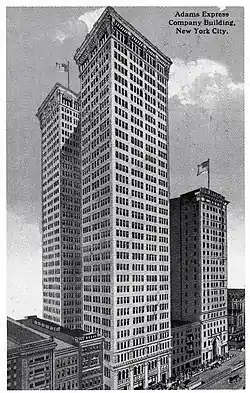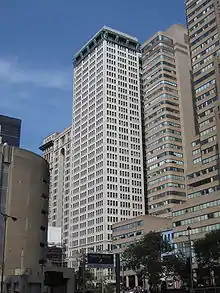Adams Express Building
The Adams Express Building is an office building at 61 Broadway in the Financial District of Manhattan in New York City. The building's primary frontage is on 57–61 Broadway, with additional frontage along 33–41 Trinity Place. Architect Francis Kimball designed the 32-story building for the Adams Express Company.
| Adams Express Building | |
|---|---|
 A 1914 postcard featuring the Adams Express Co. Building | |
| General information | |
| Type | Office |
| Architectural style | Palazzo[1] |
| Location | Financial District, Manhattan |
| Address | 61 Broadway |
| Town or city | New York City |
| Coordinates | 40°42′25″N 74°00′46″W |
| Construction started | 1912 |
| Completed | 1914[2] |
| Cost | $60,648,276 |
| Owner | Aareal Bank |
| Height | 443 ft (135.0 m)[3] |
| Technical details | |
| Structural system | Steel |
| Material | Terracotta facade |
| Floor count | 32 |
| Floor area | 670,000 sq ft (62,245 m2)[4] |
| Design and construction | |
| Architect(s) | Francis H. Kimball |
| Main contractor | Robert E. Dowling |
Construction began in 1912 at which point the cost was estimated at $2,000,000 (equivalent to $60,648,276 in 2022).[5] Upon completion in 1914, the building was the seventh tallest structure in Manhattan.
Architecture
The building contains 3,300 tons of steel and over a million square feet of architectural terracotta. The New York Times described the architectural style as "Florentine" below the fifth floor, and "severely simple" above.[6] Another critic called the style "utterly utilitarian,"[3] but the New York City Landmarks Preservation Commission identified the architecture as palazzo.[1]
An entrance was constructed to the New York City Subway's Wall Street station, underneath Broadway, but was later closed.[7]
History
Background

The Adams Express Company occupied part of the Pinkerton Building at 57-59 Broadway. In 1903, there was discussion of combining 57-61 Broadway with an adjacent property occupied by American Express and Wells Fargo, and building one large building for the three companies.[8] This did not happen, and American Express's adjacent building at 65 Broadway was completed in 1917.[9]
A 1904 fire that began in the basement of the Morris Building at 63 Broadway, damaged the Pinkerton and other buildings on the block. Twenty-four engines and six hook and ladder companies responded.[10] The Fire Department of New York recorded that the Adams Express Company building was destroyed,[11] but Adams Express continued to occupy the site. By 1906, Adams Express was planning a new, fireproof building to be constructed on the site of the Pinkerton Building.[12]
Construction
In 1910 Industrial World Magazine reported that Adams Express was proceeding with a 10-story, brick and limestone building designed by George K. Hooper of Hooper-Faulkenau Engineering Company.[4] Then in 1911, Adams Express finally purchased the Pinkerton Building.[13] Although Hooper's plans would have blended with existing buildings in the Financial District where, in 1912, nearly half of the buildings were five stories or lower,[2] the Hooper design was never constructed, as it was apparently too small. Instead, in 1912, Francis Kimball was hired to build a 32-story structure.[14]
When construction began in 1912 on the Kimball design, first The New York Times and later city planners became concerned about sunlight and airspace.[4] The Adams Express Building was one of a growing number of behemoths, most notably the then-under-construction Equitable Building,[15] that cast shadows not only on the street but on nearby smaller buildings and drove down real estate value, rent, and tax revenues. F.W. Fitzpatrick complained that the Adams Express Building cast an 875-foot shadow.[16] The 1916 Zoning Resolution provided a remedy in the form of setbacks where new buildings would be stepped back at certain heights depending on the width at the street. The restrictions would have applied to 75% of the ground area of the building, but construction of the Adams Express Building had occurred before the new zoning restrictions were adopted.
Later history
The building sustained heavy damage in 1916 when 300 windows were blown out in the Black Tom explosion.[4]
When the building was purchased by Metropolitan Life Insurance Company in 1988, an engineer discovered goldfish living in a pool of water below the basement heating system. Since that time, building engineers have fed the fish as a part of their regular maintenance routine.[4] Between 2008 and 2015, the building underwent over $13 million worth of renvovations.[17]
RXR Realty bought the Adams Express Building from Broad Street Development for $330 million in May 2014.[18][19] RXR placed the building for sale in September 2015 with an asking price of $450 million.[20][21] and agreed to sell a 49 percent stake in the property that December for about $220 million.[17][22] The next year, RXR received a $290 million loan from SL Green and Bank of China.[23] RXR considered converting 61 Broadway to apartments in February 2023, amid increased vacancy rates due to the COVID-19 pandemic.[24][25] RXR ceded control of 61 Broadway that May, having defaulted on a $240 million loan,[26][27] and handed the building back to their lender, Aareal Bank.[27] The loan was placed for sale in September 2023, when the building had a 57 percent occupancy rate.[25]
References
- "Cunard Building" (PDF). New York City Landmarks Preservation Commission. September 19, 1995. p. 7. Archived (PDF) from the original on March 14, 2017. Retrieved May 18, 2020.
- Landau, Sarah; Condit, Carl W. (1996). Rise of the New York Skyscraper, 1865–1913. New Haven, CT: Yale University Press. p. 395. ISBN 978-0-300-07739-1. OCLC 32819286.
- "Adams Express Company Building". The Woolworth Building @100. The Skyscraper Museum. Archived from the original on April 20, 2017. Retrieved August 11, 2011.
- "The 1914 Adams Express Buildling -- 61 Broadway". Daytonian in Manhattan. September 22, 2011. Archived from the original on August 8, 2014. Retrieved August 11, 2014.
- Office for Metropolitan History, "Manhattan NB Database 1900-1986," Archived February 15, 2013, at the Wayback Machine (February 7, 2010)
- "The Real Estate Field; West Side Apartment in Trade for Bronx Property -- Deal in Chelsea Section -- Adams Express Building Plans -- Buys Seven Great Neck Plots for Improvement". The New York Times. October 15, 1912. ISSN 0362-4331. Archived from the original on July 5, 2022. Retrieved August 13, 2020.
- District, New York (State) Public Service Commission First (1916). Proceedings. The Commission. p. 529. Archived from the original on July 5, 2022. Retrieved July 5, 2022.
- "Broadway Realty Deal; American Express Company Buys Harmony Estate Property. Price for 63 and 65 to be About $2,350,- 000 -- American and Adams Companies May Erect Joint Building". The New York Times. November 27, 1902. ISSN 0362-4331. Archived from the original on January 25, 2020. Retrieved January 24, 2020.
- "American Express Company Building" (PDF). New York City Landmarks Preservation Commission. December 12, 1995. p. 1. Archived (PDF) from the original on September 21, 2020. Retrieved January 24, 2020.
- "Big Fire in New York: Downtown District Threatened with Destruction". Geneva Daily Times. Geneva, New York: Geneva Printing Co. March 26, 1904. p. 1. Archived from the original on August 13, 2014. Retrieved August 12, 2014.
- Boucher, Mike. "What Happened on This Day". The Month of March. The Unofficial Home Page of FDNY. Archived from the original on November 11, 2014. Retrieved August 12, 2014.
- "New York City Notes", The Express Gazette, 31 (1): 26, January 15, 1906 [1873], archived from the original on April 7, 2022, retrieved October 17, 2016
- "The Real Estate Field; Adams Express Company Buys 57 Broadway". The New York Times. May 24, 1911. ISSN 0362-4331. Archived from the original on July 27, 2018. Retrieved August 13, 2020.
- "Latest Dealings in Realty Field; Thirty-two-Story Structure to be Erected on Old Adams Express Co. Site". The New York Times. April 21, 1912. ISSN 0362-4331. Archived from the original on July 5, 2022. Retrieved August 13, 2020.
- Nash, Eric Peter (2010). Manhattan skyscrapers. McGrath, Norman. (3rd ed.). New York: Princeton Architectural Press. p. 25. ISBN 978-1-56898-967-9. OCLC 542321843.
- Fitzpatrick, Francis (December 1919). "Cutting Steps in the Skyscraper". Popular Science. Vol. 95, no. 5. p. 52. Retrieved August 20, 2014.
- Schram, Lauren Elkies (December 4, 2015). "RXR Selling Stake in 61 Broadway to Overseas Buyer at $440M Valuation". Commercial Observer. Retrieved September 20, 2023.
- Schram, Lauren Elkies (May 29, 2014). "RXR Closes $330M 61 Bway Buy". Commercial Observer. Retrieved September 20, 2023.
- Geiger, Daniel (March 26, 2014). "Historic downtown tower fetches $330M". Crain's New York Business. Archived from the original on July 5, 2022. Retrieved April 6, 2015.
- "RXR seeks $450M for 61 Broadway". The Real Deal. September 22, 2015. Retrieved September 20, 2023.
- Mulholland, Sarah (September 21, 2015). "Manhattan Tower Said Up for Sale by RXR 16 Months After Purchase". Bloomberg.com. Retrieved September 20, 2023.
- "RXR sells 49% stake in 61 Broadway office tower". The Real Deal. December 7, 2015. Retrieved September 20, 2023.
- "RXR takes $290M mortgage on 61 Broadway". The Real Deal. April 22, 2016. Retrieved September 20, 2023.
- "RXR's Project Kodak to rethink profitability as offices remain half-full". Crain's New York Business. February 2, 2023. Retrieved September 20, 2023.
- Andrews, Jeff (September 19, 2023). "Bad Loan on Financial District Office Building For Sale". The Real Deal. Retrieved September 20, 2023.
- Pascus, Brian (May 24, 2023). "RXR Defaults on $240M Loan for 61 Broadway Office Tower". Commercial Observer. Retrieved September 20, 2023.
- Bockmann, Rich (May 24, 2023). "RXR Defaults on Office Tower at 61 Broadway". The Real Deal. Retrieved September 20, 2023.